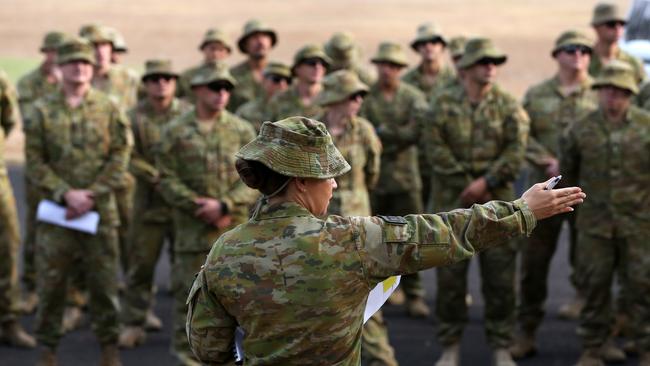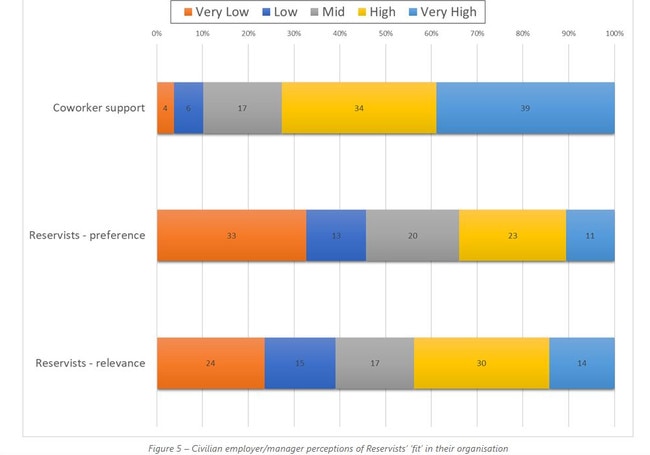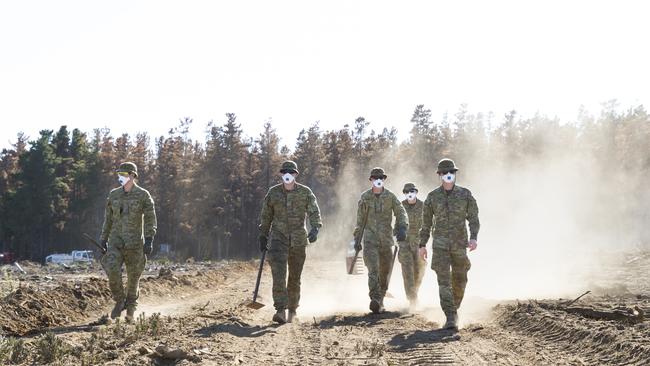Army Research Centre report: Army reservists face ‘hostility’ from civilian employers
Army reservists called up for duty are frequently met with “hostility, sanctions and discrimination” by civilian employees, a new report has found.

News
Don't miss out on the headlines from News. Followed categories will be added to My News.
Army reservists called up for duty are frequently met with “hostility, sanctions and discrimination” by their civilian employees, a new report has found, with small businesses singled out as providing “the least support” to those who put on the uniform.
Capturing the experience of 60 Army reservists and the opinions of 800 civilian managers, the Australian Army Research Centre report titled ‘Drawing on Reserves - Assessing Civilian Employer/Manager Support Employees’ Part-time Military Service’ examined the distinct challenges Army reservists experience in trying to juggle military and civilian work duties.
The report found reservists were subjected to several negative experiences.
“(Reservists) requesting defence leave frequently experience hostility, sanctions and discrimination in their workplaces,” the report said.
“This animosity generally stems from capacity issues and, in larger organisations, the unsupportive practices of middle managers.”

The report also found managers had “limited appreciation” for the skills reservists attained through their military training and brought back to their civilian duties, with 39 per cent of surveyed managers saying military training would have “low or very low” relevance in their organisation.
“This factor, coupled with short notice that reservists are often provided to attend ADF courses, creates or exacerbates workplace conflict.”
The report’s final key finding was a manager’s broader attitude towards the ADF had implications on their employee’s reservist experience.
“(It’s) a critical motivator for reservists to continue their military service in the face of workplace obstacles and disincentives.”
Small businesses were also singled out as being particularly unsupportive of reservists.
“Current compliance strategies and advocacy for ADF Reserves largely focus on attaining commitments from corporate leaders, however a clear finding of this study is that small businesses provide the least support for reservists and that larger organisations - even those that declare themselves to be supportive reserve employers - also engage in discriminatory practices,” the report said.
“This is because it is middle managers, not corporate leaders, who are most often responsible for making decisions and interacting with reservists concerning their leave entitlements.”

The Commonwealth’s reliance on ADF reservists spiked dramatically in recent years, including in 2019 with the non-negotiable deployment of reserves after the Morrison Government triggered the Defence Act’s ‘Calling out the Reserves’ powers for the first time in the nation’s history.
The compulsory call-out orders forced thousands of reserves to deploy on short notice, giving their civilian employers little time to prepare.
According to the Department of Defence’s 2023-24 annual report, of the nation’s 21,400 reserves, about 770 are based in the Northern Territory.
Special Envoy for Defence, Veterans’ Affairs and Northern Australia and Solomon MP Luke Gosling said the report underscored the importance to support reservists, who made “incredible sacrifices”.
“It’s crucial that we enhance support for them in the workplace, ensuring their contributions are fully recognised and valued,” he said.
“The government is committed to improving the relationship between the civilian workforce and the Australian Army Reserve - by better supporting reservists, we ensure they can continue to serve effectively while also succeeding in their civilian careers.”
Mr Gosling maintained backing reservists required a “whole-of-nation” approach.
“By fostering greater recognition and support in civilian workplaces, we not only empower reservists but also strengthen our national defence and security.”
More Coverage
Originally published as Army Research Centre report: Army reservists face ‘hostility’ from civilian employers





